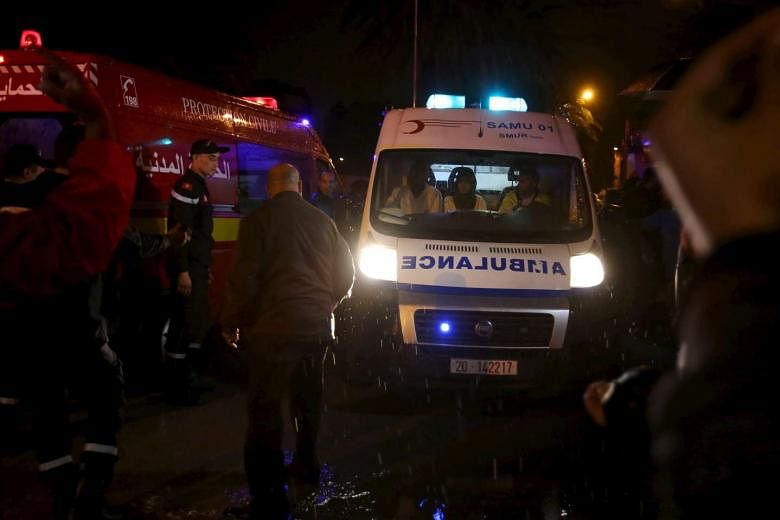TUNIS (REUTERS, AFP) - The attack on a Tunisian presidential guard bus that killed 13 was carried out by a suicide bomber who blew himself up with 10 kilos of explosives while getting into the vehicle, the government said on Wednesday (Nov 25), citing an investigation.
"According to the preliminary details, the attacker was wearing a bag on his back. He had on a coat and was wearing headphones. He blew himself up just getting into the door of the bus with military explosives," Hichem Gharbi, a presidential security official, told local Shems FM radio.
The attacker used 10 kilos of explosives in either a vest or a rucksack, the interior ministry said. "The terrorist attack was committed using a backpack or vest containing 10 kilos of explosives," a ministry statement said, without specifying whether the attack on a presidential guard bus was a suicide bombing.
At least 13 people were killed on Tuesday after the explosion tore through a bus full of Tunisian presidential guards.
Ambulances rushed wounded from the scene and security forces closed off streets around Mohamed V Avenue, one of the major streets in the capital Tunis and where the charred wreckage of the bus lay not far from the interior ministry.
Tunisian President Beji Caid Essebsi, decribing the incident as a "painful" tragedy, declared a nationwide state of emergency and a curfew from 9pm to 5am.
It is the third major attack to strike Tunisia this year after a militant killed 38 foreigners at a beach hotel in June and gunmen killed 21 tourists at the Bardo Museum in Tunis in March.
Islamic State in Iraq and Syria (ISIS) claimed both those attacks.
Security sources said the guards were boarding the bus to be taken to the presidential place on the outskirts of the city when the explosion hit. One presidential source said it was likely that a bomber had detonated his explosive belt inside.
"I was on Mohamed V, just getting ready to get into my car, when there was a huge explosion. I saw the bus blow up. There were bodies and blood everywhere," said Bassem Trifi, a witness.
At least 12 guards were killed and 17 wounded, according to an interior ministry statement.
President Beji Caid Essebsi cancelled a trip to Europe he had planned for Wednesday.
Mohamed V is a major boulevard usually packed with traffic and pedestrians, and the site of several hotels and banks.
Fighting Islamist militants has become a major challenge for Tunisia, the small North African country that was hailed as a blueprint for democratic change in the region after an uprising in 2011 ousted autocrat Zine Abidine Ben Ali.
Tunisia has had free elections and is operating under a new constitution and a broad political consensus that has allowed secular and Islamist parties to overcome a crisis that threatens to overturn their young democracy.
But several thousand Tunisians have also left to fight in Syria, Iraq and Libya with ISIS and other militant groups, and some have threatened to carry out attacks at home.
The army has also been fighting against another Islamist militant group in the mountains near the Algerian border.
Militants have hit checkpoints and patrols in rural areas in the past.

